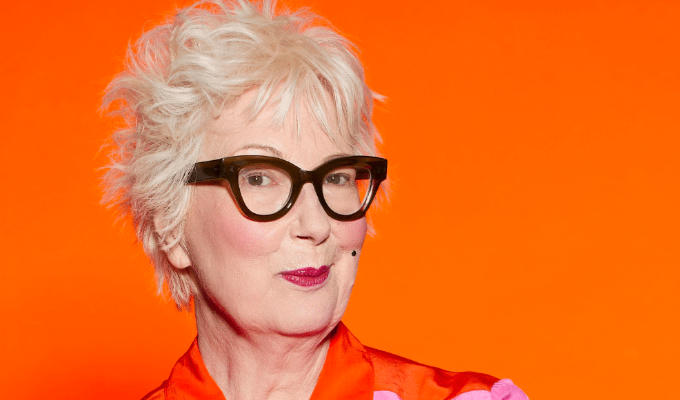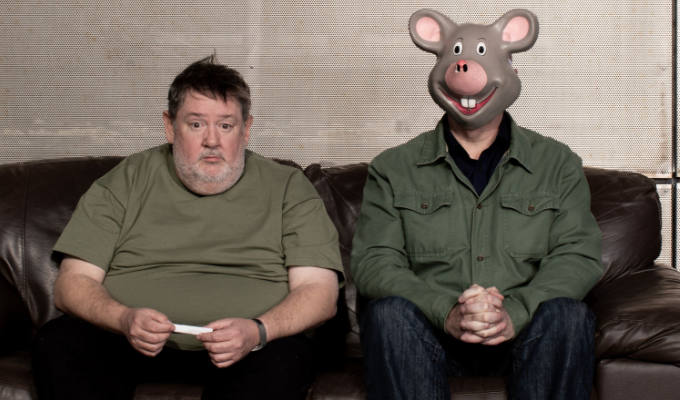 © BBC
© BBC 'You won't hear the word refugee'
Toby Jones and co-writer Tim Crouch, on their new BBC comedy Don't Forget The Driver
BBC Two comedy Don’t Forget The Driver will begin next Tuesday, April 9. It stars Toby Jones as Peter Green, a coach driver in Bognor Regis who has to come to terms with the unexpected arrival of two strangers after a trip to France. Jones also co-wrote the series with playwright Tim Crouch, who created it. Here they talk about the political undertones to their show, about learning to drive a coach – and the importance of Bognor.
Toby Jones interview
Tell us about Peter Green...
Peter is a single parent. He’s estranged from his daughter Kayla’s mother – we don’t know very much about her.
He works for Bassett’s coaches and he takes his job very seriously. He has to be responsible about timings. He has to worry about the safety of strangers. He has to take care in life.
These responsibilities weigh quite heavily on him. During the course of these six episodes, other responsibilities begin to appear to him – not least his mother, who is ailing, his daughter, whose situation is becoming more complicated, and by a strange visitor who appears to him at the end of episode one.
Is this your first foray into writing?
It’s certainly the first time I’ve written for television. Tim and I met at the National Theatre about 20 years ago, when we were both beginning to write shows for ourselves. We got on very well and talked a lot about the challenges of writing and performing your own work.
We then left it for two decades – but he got in touch to say he’d had an idea for something. He grew up in Bognor and mentioned that Bognor had a webcam on its beach. He said he sometimes communicates with his brother, who lives in Sweden and is homesick for the town. He’ll go down to the beach and speak to him on the mobile while waving at him. His brother watches him live on the webcam. I found this idea strange and slightly unsettling, but also quite touching.
So we sat down to see if we could write something together – and the story emerged really quickly, around webcams and coach drivers.
Is it a political story?
Well it’s a comedy. We wrote it as a comedy, but like everyone who’s trying to write anything now; whether it’s a novel, a play, or a piece of comedy, you’re affected by what’s going on in the world.
We didn’t want to shoehorn politics into the show – but when you’re dealing with a coastal town the show becomes political whether you like it or not. We’ve tried to reflect the ambiguities that exist in the world in the moment and the anomalies that people find themselves in - trying to find work, trying to find a place to belong.
We’ve tried to find the funny side of that and looking at the contradictions of it all. It’s not political with a capital P, but politics does play a part in it.
How important is Peter’s occupation to his characterisation?
I’ve done a lot of coach driving lessons and I’ve taken my test a couple of times. It’s a really tricky skill to master. I loved it. Controlling a vehicle that big – I’d never done that before! I quite like the challenge of looking like I know what I’m doing when I’m acting.
What’s really clear when you start studying to be a coach driver... you think it’s just an everyday job, but there’s this central idea that you have to be responsible for the safety of strangers – and often misbehaving strangers, or strangers who don’t even acknowledge your existence. That had an impact on the way we wrote and constructed the character.
However serious or farcical the situation he gets into, he has to show up for work and he cannot be late. And like a lot of people in the world of work, he’s under pressure – he can’t lose his job. He has responsibilities. It requires a certain level of patience and they train you in this. That’s a big part of playing Peter.
Has co-writing the show changed the way that you operate on set?
You’d probably have to ask other people! But it’s true, when you’ve been part of the writing team, you do have this strange relationship with every single scene that you’re in or not in.
You’re very well acquainted with the emotions that led to the scene, the story discussions that went into that scene and the other scenes that have been crushed down and the grains of which have become that scene... You’re very aware of the history of each scene.
I know the character inside-out, because I’ve discussed everything that leads up to him. Even for his twin brother, I know exactly how we want that character to act in relation to Peter.
Why Bognor?
Any British seaside town has an emotion built into it. For the British it’s the end point of where you belong. We’re an island culture and as soon as you’re on a coastline, you’re aware of everything else that’s just out there...
Bognor Regis was a royal resort. In the past, the King would come here, but now there are brightly colour funfair rides. It’s still a fine town – although slightly depressed in places. But most of these seaside towns seem depressed when it’s not sunny. There’s a faded grandeur to Bognor.
We’re living at a time when Britain is questioning its identity. The story explores issues about Britain and the rest of the world – and Britain’s comic function in the world. Britain has always been a source of comedy, because we are quite good at laughing at ourselves and the world laughs at us in a way. Bognor also a brilliant name. Bognor!
Did you draw from any real inspiration for the series?
No one from the public sphere, but you do meet people when you’re out on coach trips.
We were very keen to avoid using language that has been so overused that it has become emptied of significance. So you’ll never hear the ‘B’ word – Brexit. You won’t hear us saying migrant, you won’t hear the word refugee. We were very careful to avoid that, we wanted the action to speak for itself.
These things are in the culture and they happening right now – you don’t need to articulate it. As soon as you do articulate it, you can feel people switching off. I switch off when I think of it. We wanted to avoid people writing off the show, saying it’s any political argument. There is no big political argument in the show. There’s none. It’s about human beings.
Tim Crouch interview
What was the genesis of the project?
I grew up in Bognor Regis but I live in Brighton. I haven’t strayed far from home.
To the east of Brighton there’s a coach park on the seafront. I used to jog along past the coaches and I would see the drivers hanging out, washing their vehicles, reading the papers and chatting to each other. I was intrigued by what the narratives of those people would be.
I started taking coach trips with a firm based in Bognor - writing notes, taking photos. That’s how it all began – we wanted to follow the life of a driver through the daytrips he takes.
And then June 2016 happened and the country voted to leave the European Union. We didn’t want to write about Brexit directly, but we wanted to introduce into the story some ideas around freedom of movement. Each episode has a nice rhythm, where we see the driver going out and coming back in again, but woven through this is a bigger story about belonging - to a family and to a country.
How did Toby Jones get involved?
Toby and I have been friends for 20 years. We worked together once before - for one night only - in a play of mine that uses a different actor at each performance.
As the idea of a coach driver began to develop, I asked Toby if he’d like to get involved. I knew he’d be perfect casting for the character that was forming.
He’s perfect for just about anything, but he feels particularly right as this coach driver. When we were developing the story I sat at a laptop and Toby paced around the room, improvising and trying different things out. The part was written for him to play so it was fantastic to have him right there. It’s been a very happy and equal collaboration.
Why did you want to write for television?
I usually write for theatre – but I knew this story wasn’t a play. It’s too big. It travels to too many places. Toby Jones is one of the most experienced screen actors in the country. He brought his huge experience to the process. He’s educated me in the medium from an actor’s point of view. Also, neither of us has written for TV before - so there's been a freshness to our approach - a strong feeling of discovery.
Why Bognor Regis in particular?
There’s something I find beautiful about Bognor. I spent 18 years there. My dad still lives there. Every time I visit I’m swamped by nostalgia. There’s a particular quality of Englishness in this small town - a sense of the world passing it by somewhat. It’s what we all feel - that life is happening somewhere else. It’s also by the sea, our biggest border in a way, so it felt right to do it here at a time when our borders are being re-examined.
Tell us more about the themes of the series.
First and foremost, it’s a comedy about a coach driver.
But I suppose it’s also about stagnation - a sense of bewilderment about where we are now, the threat to our identity, and the fear of change and integration. It’s about staying still, rather than moving forward.
It shows a family in Bognor who haven’t got involved in the world, but who are suddenly faced with events that come from wider, geopolitical actions. We try to do this as lightly and subtly as possible. It’s not heavy and it’s extremely funny in places.
It’s not a sitcom - because the situation in which the characters find themselves is often quite serious. What’s refreshing is an honest and often hilarious sense of confusion and bewilderment in the midst of these turbulent times. And if anyone plays bewilderment well, it’s Toby Jones...
Published: 2 Apr 2019






